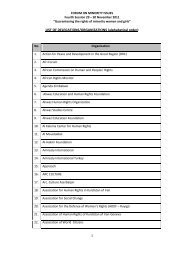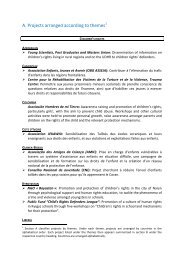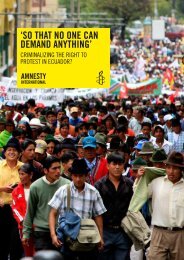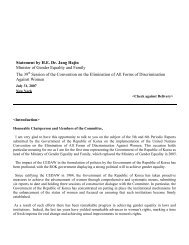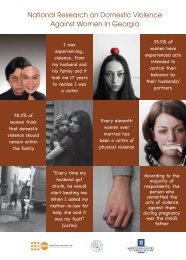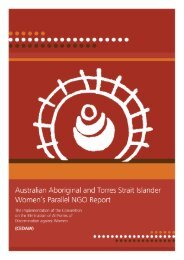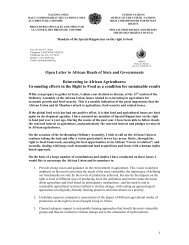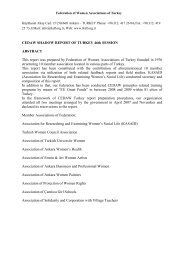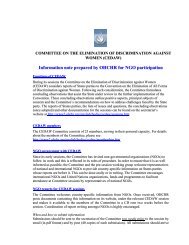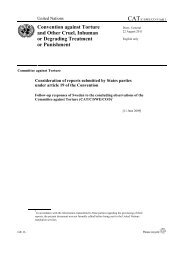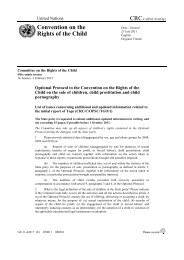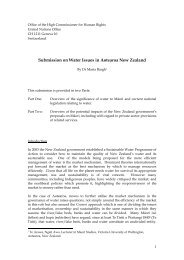Report - Office of the High Commissioner on Human Rights
Report - Office of the High Commissioner on Human Rights
Report - Office of the High Commissioner on Human Rights
- No tags were found...
You also want an ePaper? Increase the reach of your titles
YUMPU automatically turns print PDFs into web optimized ePapers that Google loves.
c<strong>on</strong>diti<strong>on</strong>s are so harsh that it affects <str<strong>on</strong>g>the</str<strong>on</strong>g> pers<strong>on</strong> psychologically, physically, emoti<strong>on</strong>ally and socially.<br />
There is also a high level <str<strong>on</strong>g>of</str<strong>on</strong>g> violence, which prevents women from enjoying <str<strong>on</strong>g>the</str<strong>on</strong>g>ir rights to peace and<br />
human dignity.<br />
Element – Accessibility:<br />
She lacks access to credit. She also lacks access to justice (i.e. does not have informati<strong>on</strong> or resources<br />
to use <str<strong>on</strong>g>the</str<strong>on</strong>g> land laws, NLTA, family laws, customary laws for children born to indigenous Fijian fa<str<strong>on</strong>g>the</str<strong>on</strong>g>rs).<br />
Family law is critical for obtaining equal shares in matrim<strong>on</strong>ial property.<br />
Element – Participati<strong>on</strong> and self-expressi<strong>on</strong>:<br />
An ethnic woman’s access to property is totally dependent <strong>on</strong> her relati<strong>on</strong>ship to her fa<str<strong>on</strong>g>the</str<strong>on</strong>g>r, bro<str<strong>on</strong>g>the</str<strong>on</strong>g>r,<br />
or children and whatever entitlements <str<strong>on</strong>g>the</str<strong>on</strong>g>y have. Therefore, her right to participati<strong>on</strong> and self-expressi<strong>on</strong><br />
is paramount for her independence.<br />
Sources –<br />
- C<strong>on</strong>stituti<strong>on</strong> - Secti<strong>on</strong> 38 (equality <strong>on</strong> <str<strong>on</strong>g>the</str<strong>on</strong>g> basis <str<strong>on</strong>g>of</str<strong>on</strong>g> sex and gender), Secti<strong>on</strong> 42(1) (public law<br />
basis <str<strong>on</strong>g>of</str<strong>on</strong>g> interpretati<strong>on</strong>);<br />
- Family Law Act 2003 – if a woman has been c<strong>on</strong>tributing to property n<strong>on</strong>-financially, it should<br />
be recognized for <str<strong>on</strong>g>the</str<strong>on</strong>g> property settlement; can claim maintenance if child is over 18 years old;<br />
- Social Justice Act;<br />
- CRC (Article 16 (1), 27 (3)), CERD (Article 5 (e) (iii)) CEDAW (Article 16(1) (h)), ICESCR<br />
(Article 11), UDHR (Article 25 (1)), CAT (Article 16(1)), ICCPR (Article 9(1);<br />
- Habitat II C<strong>on</strong>ference (1996, Istanbul), Beijing Platform for Acti<strong>on</strong>, Vienna Declarati<strong>on</strong>, SRAH.<br />
Over-riding principles – Gender equality, rule <str<strong>on</strong>g>of</str<strong>on</strong>g> law, and self-determinati<strong>on</strong>.<br />
Guarantee – C<strong>on</strong>stituti<strong>on</strong>, Family Law Act and ratified internati<strong>on</strong>al c<strong>on</strong>venti<strong>on</strong>s (CRC, CERD, CEDAW,<br />
CAT), Beijing Platform for Acti<strong>on</strong>. CEDAW ratified in 1995 and NGOs have submitted <str<strong>on</strong>g>the</str<strong>on</strong>g> first parallel<br />
report for CEDAW.<br />
Causes/Threats – Col<strong>on</strong>ial history, left ethnic women <str<strong>on</strong>g>the</str<strong>on</strong>g> most vulnerable. No adequate laws for<br />
guaranteeing women’s right to adequate housing and land at <str<strong>on</strong>g>the</str<strong>on</strong>g> nati<strong>on</strong>al level. No affirmative policies<br />
for single women who are without collateral to access loans/credit. Lack <str<strong>on</strong>g>of</str<strong>on</strong>g> redress for children born<br />
to indigenous fa<str<strong>on</strong>g>the</str<strong>on</strong>g>rs, where indigenous fa<str<strong>on</strong>g>the</str<strong>on</strong>g>r is unwilling to register <str<strong>on</strong>g>the</str<strong>on</strong>g>m under customary law. Laws<br />
are biased against women (e.g. do not take into c<strong>on</strong>siderati<strong>on</strong> women’s role and c<strong>on</strong>tributi<strong>on</strong>s) and<br />
poorly enforced. The bias in <str<strong>on</strong>g>the</str<strong>on</strong>g> laws is reinforced by patriarchal biases and gender stereotypes within<br />
<str<strong>on</strong>g>the</str<strong>on</strong>g> cultures (patrilineal) and religi<strong>on</strong>s (male dominated).<br />
Victimisati<strong>on</strong> – Women, ethnic women and <str<strong>on</strong>g>the</str<strong>on</strong>g>ir children.<br />
Violators – Men, State, banks, customary forums, religious instituti<strong>on</strong>s, law making bodies – where do<br />
ethnic women fit into <str<strong>on</strong>g>the</str<strong>on</strong>g>se instituti<strong>on</strong>s and structures.<br />
Duty holders – State, col<strong>on</strong>ial rulers, and service providers.<br />
EXECUTIVE SUMMARY 181



